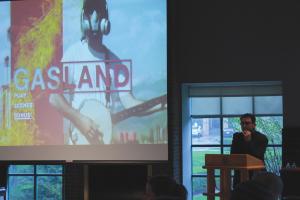Marcellus shale drilling is occurring across the U.S., with large concentrations in New York, Ohio, Pennsylvania and West Virginia, and has been referred to as the Saudi Arabia of natural gas.
Josh Fox, creator of the Sundance Award winning and Oscar nominated documentary, Gasland, met on Tuesday afternoon with more than 50 students, faculty and community members in the Hermann Student Union Great Room, addressing questions not only about his documentary, but also about the hydraulic fracturing that is scheduled to start locally. Fox also spoke later to the community.
 Jill Barrile photo: Director of ‘Gasland’ Josh Fox came to Mercyhurst College to talk to the community and students about hydraulic fracturing.
Jill Barrile photo: Director of ‘Gasland’ Josh Fox came to Mercyhurst College to talk to the community and students about hydraulic fracturing.
Fox is a Milanville, Pa., resident who became involved with the fracking debate when a gas company approached him and his neighbors about leasing their land.
Originally just a local effort, Fox quickly found himself immersed in what he calls a “new thing going dreadfully wrong.”
Fracking, or hydraulic fracturing, is the process of inserting water and chemicals into the ground at high pressure to release gas trapped in the shale. This process has led to ground water contamination by both the chemicals used in the process and the natural gas that has been released.
“When I began to look into it I got very conflicting stories from the gas industry and from neighbors of mine,” said Fox. “I started becoming concerned with this proposal and quickly became an activist.”
Environmental issues weren’t always what Fox had in mind when he started his own theater company in 1996, but he doesn’t think they are that far off.
“My reactions to the things that come into my life as an artist is to make a project out of it,” said Fox. “Drama is always about the conflicts of its time,” and Gasland is no exception.
Fox took this issue and made a “sincere attempt to persuade land owners who were going to lease” their land not to do so with his documentary.
“We did things that were artistically interesting and were narratively interesting. It’s a whole lot of efforts all happening at once,” he said.
Until five years ago, this process was unheard of and today it is feeding to the largest natural gas boon in U.S. history.
“For the first time you have millions of people in a drillable zone,” Fox said.
This includes some Pennsylvania universities, which are facing 50 percent budget cuts in 2011. Pennsylvania Gov. Tom Corbett has suggested that universities invest in shale drilling as an additional source of revenue.
“We are in the middle of a great divide of politicians,” said Fox. “There are those who are just satisfied with taking that money, which creates an uncomfortable dilemma for the people who aren’t okay with that.”
The talk also focused on the local drilling scheduled for North East in Erie County and what citizens can do to prevent it.
“Right now this is a true test of whether democracy will survive,” said Fox. “Is democracy still a bottom-up process or is it whoever pays the most money?”
Fox encouraged interested students to create an anti-fracking group on campus, and numerous students expressed a variety of emotions after the session, including concern for the environment and the community.
“I am in shock of how unaware people are about the environment and how all these political figures are trying to take money by trying to discourage us from figuring out the truth. The environment is so important and many more people have to get involved because it’s our life,” freshman Kathleen Reveille said.
“This is just another example of how unaware people are, how much there is to learn and to stay informed as to what’s going on in the world around you. It’s within our own state, so it’s just important to stay involved and stay informed, even as students, because these things apply to us, too,” freshman Natalie Pertz said.
On a lighter note, “It’s great to see students and the community come together for an event like this. We need to stick with it and keep the community informed,” junior John Weber said. Weber is from Hagerstown, Md., an area also affected by fracking.
“I feel a responsibility to what is in the film,” Fox said. Fox is now working on Gasland 2.
“We had a great turnout. Fox’s knowledge, combined with his wit and experience with the people affected by fracking, did an ample job of informing people without raising alarm,” communication department Chair Anne Zaphiris, Ph.D., said.
For more information on Mercyhurst’s anti-fracking club that is to be started on campus, contact Zaphiris at extension 3382.
